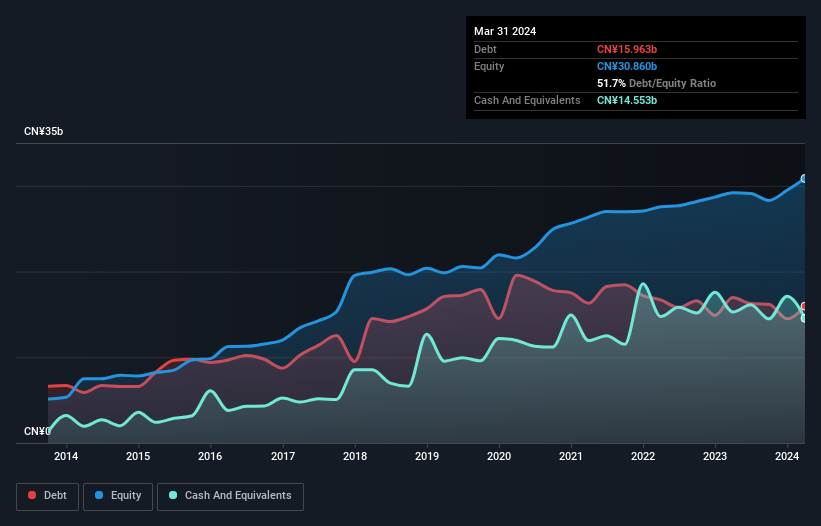- China
- /
- Healthcare Services
- /
- SHSE:600998
These 4 Measures Indicate That Jointown Pharmaceutical Group (SHSE:600998) Is Using Debt Reasonably Well

Howard Marks put it nicely when he said that, rather than worrying about share price volatility, 'The possibility of permanent loss is the risk I worry about... and every practical investor I know worries about.' So it might be obvious that you need to consider debt, when you think about how risky any given stock is, because too much debt can sink a company. We note that Jointown Pharmaceutical Group Co., Ltd (SHSE:600998) does have debt on its balance sheet. But the real question is whether this debt is making the company risky.
When Is Debt Dangerous?
Debt is a tool to help businesses grow, but if a business is incapable of paying off its lenders, then it exists at their mercy. Part and parcel of capitalism is the process of 'creative destruction' where failed businesses are mercilessly liquidated by their bankers. However, a more common (but still painful) scenario is that it has to raise new equity capital at a low price, thus permanently diluting shareholders. By replacing dilution, though, debt can be an extremely good tool for businesses that need capital to invest in growth at high rates of return. When we examine debt levels, we first consider both cash and debt levels, together.
View our latest analysis for Jointown Pharmaceutical Group
What Is Jointown Pharmaceutical Group's Debt?
You can click the graphic below for the historical numbers, but it shows that Jointown Pharmaceutical Group had CN¥16.0b of debt in March 2024, down from CN¥17.0b, one year before. However, it does have CN¥14.6b in cash offsetting this, leading to net debt of about CN¥1.41b.

A Look At Jointown Pharmaceutical Group's Liabilities
According to the last reported balance sheet, Jointown Pharmaceutical Group had liabilities of CN¥63.5b due within 12 months, and liabilities of CN¥2.93b due beyond 12 months. On the other hand, it had cash of CN¥14.6b and CN¥43.6b worth of receivables due within a year. So its liabilities outweigh the sum of its cash and (near-term) receivables by CN¥8.23b.
Jointown Pharmaceutical Group has a market capitalization of CN¥22.6b, so it could very likely raise cash to ameliorate its balance sheet, if the need arose. However, it is still worthwhile taking a close look at its ability to pay off debt.
We measure a company's debt load relative to its earnings power by looking at its net debt divided by its earnings before interest, tax, depreciation, and amortization (EBITDA) and by calculating how easily its earnings before interest and tax (EBIT) cover its interest expense (interest cover). This way, we consider both the absolute quantum of the debt, as well as the interest rates paid on it.
While Jointown Pharmaceutical Group's low debt to EBITDA ratio of 0.29 suggests only modest use of debt, the fact that EBIT only covered the interest expense by 4.0 times last year does give us pause. So we'd recommend keeping a close eye on the impact financing costs are having on the business. Jointown Pharmaceutical Group grew its EBIT by 6.9% in the last year. That's far from incredible but it is a good thing, when it comes to paying off debt. The balance sheet is clearly the area to focus on when you are analysing debt. But ultimately the future profitability of the business will decide if Jointown Pharmaceutical Group can strengthen its balance sheet over time. So if you're focused on the future you can check out this free report showing analyst profit forecasts.
Finally, a company can only pay off debt with cold hard cash, not accounting profits. So we clearly need to look at whether that EBIT is leading to corresponding free cash flow. Over the most recent three years, Jointown Pharmaceutical Group recorded free cash flow worth 66% of its EBIT, which is around normal, given free cash flow excludes interest and tax. This free cash flow puts the company in a good position to pay down debt, when appropriate.
Our View
Jointown Pharmaceutical Group's net debt to EBITDA suggests it can handle its debt as easily as Cristiano Ronaldo could score a goal against an under 14's goalkeeper. But truth be told we feel its interest cover does undermine this impression a bit. We would also note that Healthcare industry companies like Jointown Pharmaceutical Group commonly do use debt without problems. All these things considered, it appears that Jointown Pharmaceutical Group can comfortably handle its current debt levels. On the plus side, this leverage can boost shareholder returns, but the potential downside is more risk of loss, so it's worth monitoring the balance sheet. The balance sheet is clearly the area to focus on when you are analysing debt. However, not all investment risk resides within the balance sheet - far from it. For example, we've discovered 1 warning sign for Jointown Pharmaceutical Group that you should be aware of before investing here.
At the end of the day, it's often better to focus on companies that are free from net debt. You can access our special list of such companies (all with a track record of profit growth). It's free.
If you're looking to trade Jointown Pharmaceutical Group, open an account with the lowest-cost platform trusted by professionals, Interactive Brokers.
With clients in over 200 countries and territories, and access to 160 markets, IBKR lets you trade stocks, options, futures, forex, bonds and funds from a single integrated account.
Enjoy no hidden fees, no account minimums, and FX conversion rates as low as 0.03%, far better than what most brokers offer.
Sponsored ContentNew: Manage All Your Stock Portfolios in One Place
We've created the ultimate portfolio companion for stock investors, and it's free.
• Connect an unlimited number of Portfolios and see your total in one currency
• Be alerted to new Warning Signs or Risks via email or mobile
• Track the Fair Value of your stocks
Have feedback on this article? Concerned about the content? Get in touch with us directly. Alternatively, email editorial-team (at) simplywallst.com.
This article by Simply Wall St is general in nature. We provide commentary based on historical data and analyst forecasts only using an unbiased methodology and our articles are not intended to be financial advice. It does not constitute a recommendation to buy or sell any stock, and does not take account of your objectives, or your financial situation. We aim to bring you long-term focused analysis driven by fundamental data. Note that our analysis may not factor in the latest price-sensitive company announcements or qualitative material. Simply Wall St has no position in any stocks mentioned.
Have feedback on this article? Concerned about the content? Get in touch with us directly. Alternatively, email editorial-team@simplywallst.com
About SHSE:600998
Jointown Pharmaceutical Group
Provides pharmaceutical supply chain services in China.
Undervalued with excellent balance sheet and pays a dividend.
Market Insights
Community Narratives



